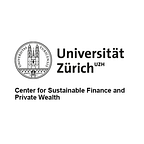Research News
A few months ago, a vaccine for Covid-19 was headline #1. Today, discussions and dialogues are nuanced and the topic of enabling a sustainable recovery is gaining traction. This is why we at the Center for Sustainable Finance & Private Wealth decided to launch a fresh newsletter dedicated to our research. This is the first edition!
Below are examples of how you can have real-world impact, how new technologies are used to mainstream climate risk, and how ESG stocks survived the financial hit caused by the global health crisis. And in case you are still wondering whether sustainability is a niche, I suggest you browse through the Swiss Sustainable Market Study. Spoiler alert: the trend toward the mainstream could not be clearer.
Sincerely,
Julian Kölbel
Head of Research at CSP
Can Sustainable Investing Save the World?
Reviewing the Mechanisms of Investor Impact
This fresh publication looks at THE question that has riddled the impact investor sphere for years: how to have impact for real. To put it short, the paper finds that that investors who strive for impact should:
- Pursue shareholder engagement throughout their portfolio
- Invest in sustainable companies whose growth is limited by external financing conditions
- Screen out companies with poor environmental and social business practices, in order to nudge them to improve such practices
Simple! Yet, not what most investors are doing.
Read, see, and learn more here.
If you want to read more about this in French, here is a recent article about the findings in Le Temps.
Sustainability in the Time of Uncertainty is Certainty
The working paper presents evidence on the resilience of sustainable stocks to the market shock induced by the Covid-19 crisis. The paper shows that sustainability ratings reflect stocks’ uncertainty profiles, such as their implied and realized price volatility. This finding points to the importance of considering sustainability scores in investment decisions to mitigate stock-specific risks.
Read the full paper by Julia Meyer and Ola Mahmoud here
Novel Risk Measure Based on Artificial Intelligence Highlights the Relevance of Climate Risk
What do company regulatory documents say about climate risk exposure? And how do credit investors respond? The paper applies BERT, an advanced algorithm that can interpret language, to analyze the disclosures that corporations make about business risks, including climate risks. The results show that while credit markets are beginning to respond to climate risk, only risks related to carbon regulation is priced. The physical risks of climate change itself are still being ignored.
Read the paper by Julian Kölbel, Markus Leippold, Jordy Rillaerts, and Qian Wang here
Swiss Sustainable Investment Market Study 2020
The annual market study finds 62% growth in sustainable investing, passing the 1 trillion milestone. The report is based on a sample of more than 70 Swiss asset managers and owners and concludes:
- The Swiss sustainable investment market has moved from ESG data processing to active ownership marking a move toward real-world impact
- The main challenge expressed by the interviewees was lack of standards — instead of conviction and demand
- Private investors increased their presence on the market with 185% — a substantial leap mainly due to the mainstreaming of sustainability
The Global Impact of Covid-19 on Fintech Adoption
The paper draws mobile application data from 74 countries comprising roughly 80% of the world’s population and documents how Covid-19 has accelerated the adoption of digital financial services and fintech worldwide. Developing and non-developed countries exhibit similar post-COVID increases in the adoption of tech, yet data highlights the risks of exclusion at sub-national level, for example, with the elderly disproportionally lacking access to tech across the globe. The researchers will next focus on defining the “winning” and “losing” products and providers as well as explore how the large-scale shift to digital financial services may impact the real economy.
